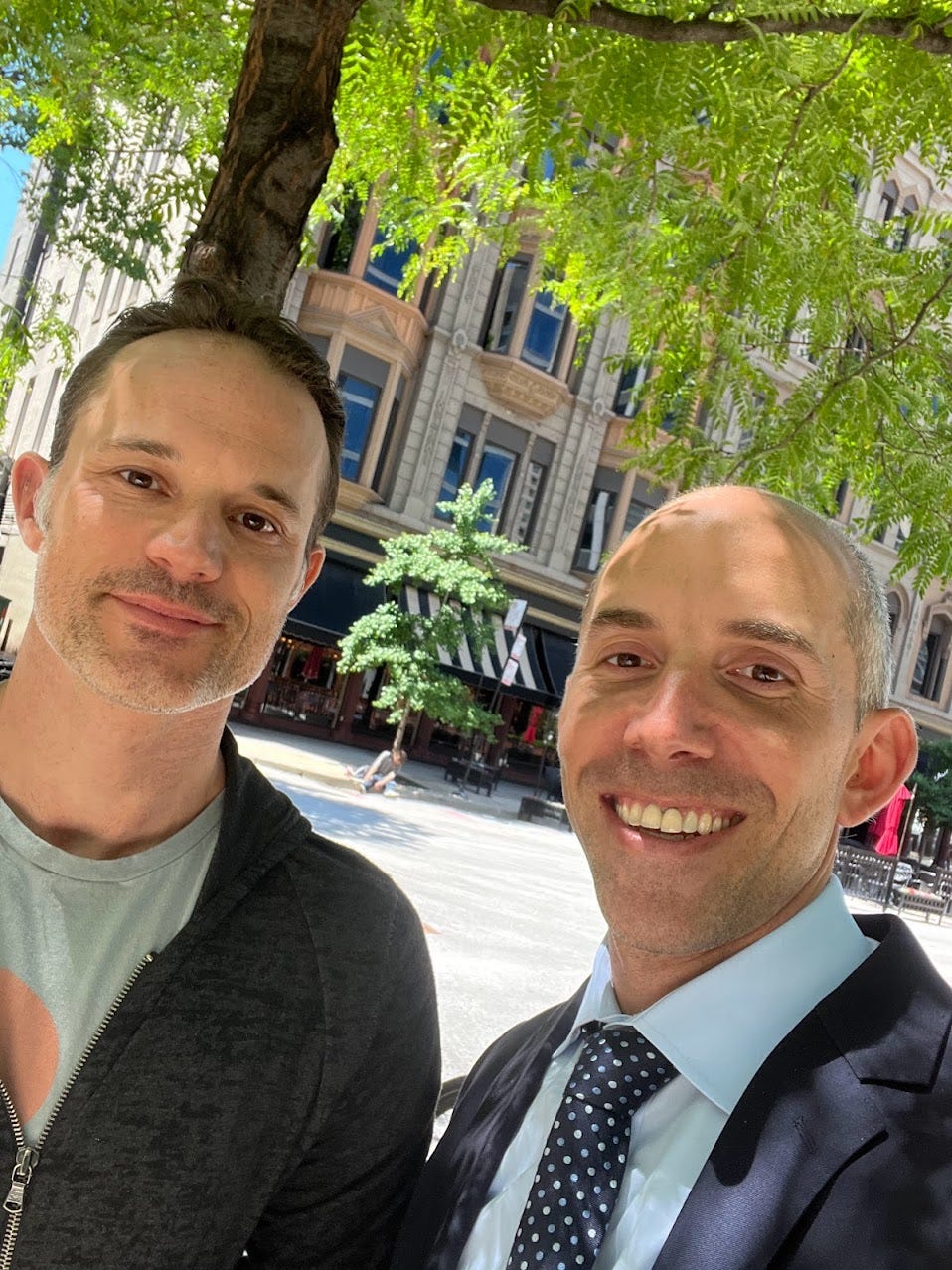🔥Welcome to Volume #00087!🔥
I’m Christian Champ. This is ☯️The Middle Way Newsletter ☯️. It is a place where I write, explore, share, and invite you along for the journey.
If you enjoy the newsletter, please share it with your friends.
How to Do Hard Things… Which Makes Them Become Easier
One of the mottos of our house is to do hard things.
This is based on the ethos that I grew up with and conveyed by my grandfathers.
My grandfather was my best friend, and I try to channel his influence when possible. He lived through the Great Depression and had stories of struggle and making struggle easier.
He made it 97 years and was out shoveling snow days before he left us. He embraced the hard things.
The 2020s American version of hard things is different than serving in a World War and scrapping by during a depression.
Remembering his influence and doing the remixed version of “hard things,” I signed up for a drawing class. Each day I drew for five hours, taking the zoom version of Betty Edward’s Drawing With the Right Side of Your Brain.
Drawing presents itself as a struggle for me. I’m a grade school art student only, spit on by a school system that told me I was sloppy, messy, and poor at art without offering me any tools or guidance on how to improve.
My “limitations” show up on full display. I struggle to draw straight lines and get stuck in a loop of one “bad” line after another which plagues one’s artwork.
Two things are at play when I draw.
I judge myself harshly, limiting my progress, disrupting my flow, and creating the conditions I wish to avoid. Then after I finish self-sabotaging, I re-affirm my belief that I’m a shitty artist.
It's an interesting feedback loop.
Barley practice —> Create bad art —> Tell myself I suck at it —> Repeat
How often do we half-ass something, fail to hit our ridiculous expectations, and say, “See, I suck at this.”
When I ask myself, “what am I pretending not to know?” it is clear that I’m pretending this system of self-sabotage is my drawing “reality.”
The joke about hard things is that the more we do them, the easier they become.
They can still remain hard, but unless you increase the degree of difficulty, we whittle away at the hard part of it.
Thus I’m grinding on the zoom, drawing an upside-down Picasso piece. When we draw upside down, we trick our left brain and stop judging our work. The piece comes out looking halfway decent, and my brain notes nice work for a not-so-good artist.
This upside judo move made a hard thing easy. It changed my perception of the drawing and my perception of myself as an artist.
The next move leveled up my skills even more. We learned to draw shapes as opposed to objects. We don’t draw eyes, but we draw the lines and shapes that we see. This overrides our programmed “symbols” for body parts and objects.
All of life is perspective and perception. When we shift those, we can see, create and do things in different and better ways. It adds more mental models to our toolbox.
I didn’t find greatness. I learned to let go, show up and do the work in a better manner.
The keep going part got challenging at times, but the ability to learn and grow in the right environment with solid guidance leads to good outcomes.
It’s like the quote that we can’t do much in a day, but we can do a lot in a year.
Now I need to keep practicing and engrain the tools and techniques along with continuing to flex and grow my skills of perception.
The hard thing about drawing became easier.
What hard things do you need to make easy?
If anyone is interested in taking the workshop, here is the link.
📓Things to Think About📓
People with Too Many Interests Tend to Be Successful
This piece speaks to my strong bias to try to learn a little about a lot and find and master Pareto Laws (the 20% that drives the 80%).
We want to be Foxes, not Hedgehogs. Foxes know a little bit about a lot and then can combine patterns from different disciplines. They keep an open mind about things. A hedgehog knows one thing well. They are a hammer and everything is a nail.
The specialist is the hedgehog, and the fox is the generalist. Now, we are pre-supposing that you are not going to be a crappy fox or crappy hedgehog, which ruins things.
If being a generalist was so ineffective, why are the founders of the five largest companies in the world — Bill Gates, Steve Jobs, Warren Buffett, Larry Page, and Jeff Bezos — all polymaths (who also follow the 5-hour rule)? Are these legends just genius anomalies? Or are they people we could and should imitate in order to be successful in a modern knowledge economy?
If being a generalist is an ineffective career path, why do 10+ academic studies find a correlation between the number of interests/competencies someone develops and their creative impact?
The author of the piece followed his own advice with how he put together his writing career
In order to become an effective online writer, I’ve deliberately combined academic research, digital journalism, and growth hacking into one skillset. I didn’t go to college for any of these skills, but practiced them over time and received coaching on them. My observation is that academics often look down on journalists; journalists look down on marketers; and marketers look down on journalists and academics. What many fail to see is that each brings something valuable to the table and that all of these skills combined lead to great ideas seen by large audiences.
The Power of Company Culture by Taylor Pearson
Anyone in an organization knows the power of culture. It can propel us to new heights or hold us down like running with a weighted vest on.
The article opens with, Peter Thiel telling Airbnb the most important thing they can do is…
He replied, “Don’t fuck up the culture.”
When you luck out, you work with people that cultivate and create a strong company culture. When you don’t, you run into garbage leaders who say things like “I don’t care if they are a good culture person” and through in some F-bombs to boot.
Not surprisingly, the former folks go on to great success, and the later leaders spend their time playing politics, losing good employees, and creating a bottom quartile company. The bad culture creators blame others or circumstances for the failures.
The future trajectory of a business is merely the sum of all one-off decisions. While any single decision may not be particularly important, in aggregate, they are everything.
Your culture is a leading indicator of your business’s overall health. One-off decisions made for the first time today may not seem that important. But, they put a company onto a particular trajectory that compounds over time. As anyone that has worked at or with a large company knows, institutional inertia is very real and very hard to change.
Good culture comes from learning organizations, where everyone gets better no matter their place in the company hierarchy. Some leaders and firms focus on lifelong learning, open discussion and debate, and making each other better. Other places focus on cocktails, dinners, and hierarchy.
You can guess which one performs better.
If you have a culture of ownership where everyone gets 1% better at their job every week, it won’t really make a difference in the short run. But, if you have an organization that has been around for a decade where everyone is always getting better at their job, it is likely to be a category leader.
Culture relies on how people with power within the organization act and signal. Do they go first and walk the talk? Do they even talk the talk?
Good managers know that one of the reasons employees do not adhere to cultural principles is because they are fearful of potential punishments for not having been productive in the short term. Therefore, good managers personally take visible actions incurring these costs, to show that they are truly worth paying and that everyone is expected to do so.
Erik Tornberg on The Current Thing
We need to watch we don’t keep getting our attention (which is our most important resource) stuck on chasing “the current thing.” Supporting the “opposite of the current thing” is the same side of that coin.
Eric offers three takes on the current thing. The third view feels the most relevant.
A charitable view is that it’s the wisdom of crowds surfacing the most important problems as well as the best ways of solving those problems.
A less charitable view is that Current Things are “continuous overlapping sequence of emergencies, awakenings and panics, driven by the same interlocking power centers, demanding ever tighter censorship of speech and thought.”
An even less charitable view is that Current Things, paraphrasing Balaji, are the social equivalents of pump and dumps: They are pump and dumps for clicks for the journalists, votes for the politicians, and dollars for the activists. After all, the business model of the press & social media might as well be to cause the reader as much outrage as possible, every day, to cause fear and panic and drive them to come back tomorrow.
Ultimately the current thing is being used to show group support. This is a trap we want to avoid.
So, Current Things may be true, it’s just that truth has little to do with whether what becomes The Current Thing. The Current Thing is not about people trying to find truth, it’s about people expressing loyalty to their group.
💣Words of Wisdom💣
“The path of not here is part of the path of here." (Boyd Varty, The Lion Tracker's Guide to Life)
“From a very early age-thirteen, maybe-I made a firm rule for myself. Never waste a minute. The most precious thing you have is your time. Our lives are narrowed by birth and death, and in between lies everything you set yourself to achieve.” (Diana Beresford-Kroeger, To Speak for the Trees)
"Sometimes there isn’t one definitive truth. (My favorite situations.) And sometimes there is one and you can’t see it. (Least favorite. Least.)" (Adrienne Maree Brown, Emergent Strategy)
"That's the thing I'm always chasing, inspiration with a palpable strain of risk." (Bob Odenkirk, Comedy Comedy Comedy Drama)
"How to give voice to those raw, essential, heartbreaking and life-giving places in us, so that we may know them more consciously, live what they teach us, and mine their wisdom for our life together?" (Krista Tippett, Becoming Wise)
"Speaking really is not about “telling” the audience information. It’s more about “showing” the audience so that they get an experience that really sinks in. Gladwell always follows the principle of showing rather than just telling." (Akash Karia, TED Talks Storytelling)
"Listening is not a passive act. It is distinguished by a special activity: first I must welcome the Other, which means affirming the Other in their otherness. Then I give them an ear. Listening is a bestowal, a giving, a gift." (Byung-Chul Han, The Expulsion of the Other)
"What do I mean by ‘betweenness'? Think about the nature of music. Music does not exist in one particular note – which is in itself meaningless; or in a lot of such single notes, each in itself meaningless." (Iain McGilchrist, The Divided Brain and the Search for Meaning)
“Expectation. That is the true soul of art. If you can give a man more than he expects, then he will laud you his entire life. If you can create an air of anticipation and feed it properly, you will succeed." (Brandon Sanderson, Words of Radiance)
"The principles I am most mindful of through every step of the presentation process are restraint, simplicity, and naturalness: Restraint in preparation. Simplicity in design. Naturalness in delivery." (Garr Reynolds, Presentation Zen)
"No matter what skill you set out to learn, the pattern is always the same: See the whole thing. Break it down to its simplest elements. Put it back together. Repeat." (Daniel Coyle, The Little Book of Talent)
🙏Thanks for reading🙏
What hard things do you want to make easy?
What hard things do you need to try to tackle?
Any thoughts or comments, please share!
Namaste,
Christian
One of us is doing the investor roadshow trip during a perfect June day in Chicago.

















